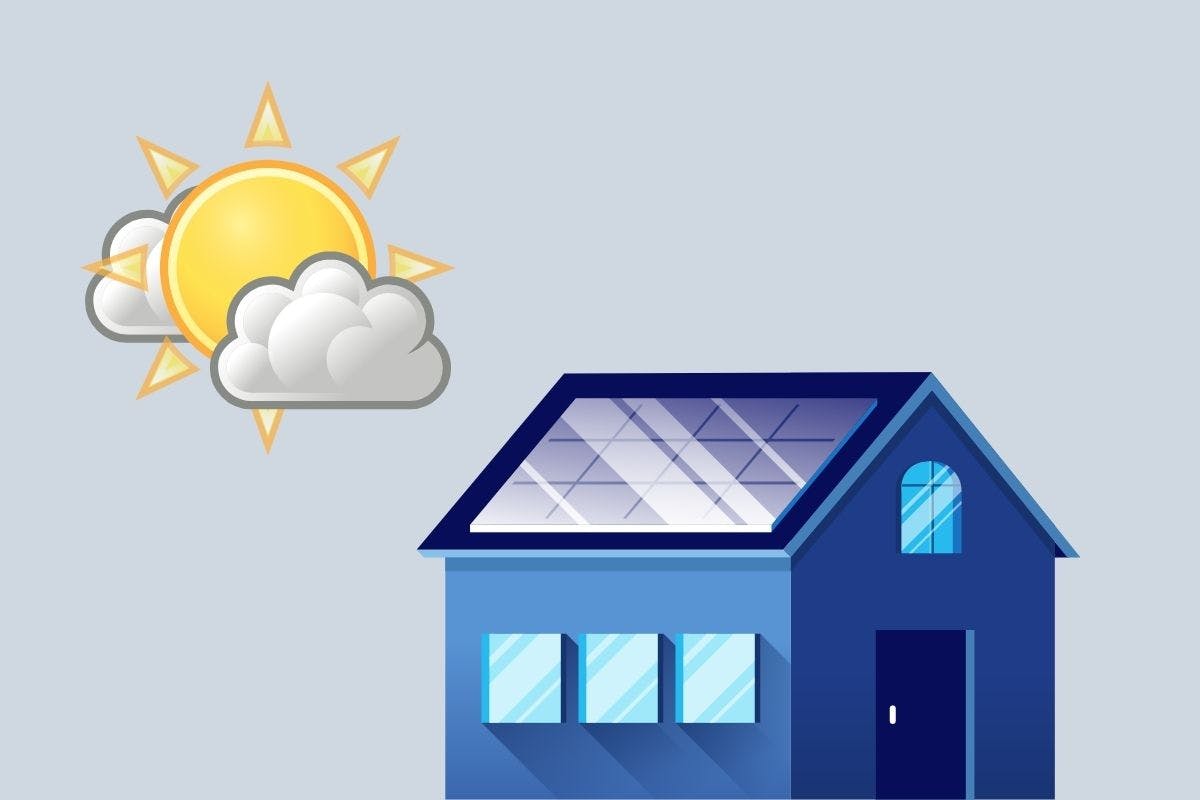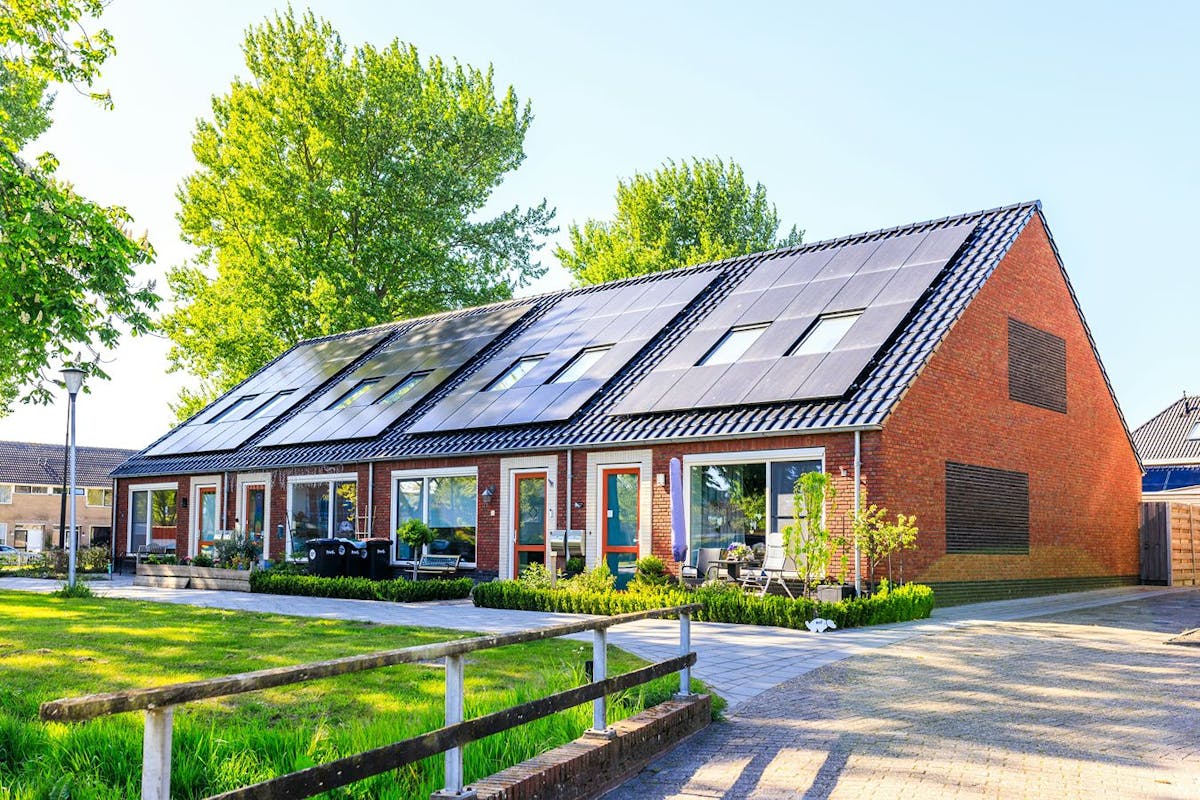Do Solar Panels Work on Cloudy Days?
Last edited

Author
Andrew Giermak
Solar and Electrification Writer and Editor

Editor
Andrew Blok
Electrification and Solar Writer and Editor

Solar power makes easy sense in Florida or Arizona. But, you might not guess there are home solar panels generating free, clean electricity in all 50 states.
Solar power systems should be designed for your exact property, which includes your usual year-around climate. Cloudy conditions and all types of weather are included in planning a new system. In fact, Ohio, New York, Illinois, and Indiana were among the leading states in solar installations in 2024 according to the Solar Energy Industries Association.
Even in areas with more than their fair share of gray, cloudy weather, solar panels could reduce your energy bills and save you money.
See how much you can save by going solar with Palmetto
Will Solar Panels Work on a Cloudy Day?
Yes, solar panels will still generate electricity from indirect sunlight sources. They are designed to use every possible ray of sunlight that comes their way. This includes producing electricity on partly cloudy and totally clouded-over days.
If you’ve ever gotten a sunburn while working outside, even with cloud cover, then you understand the sun’s energy still gets through clouds. Even if you can’t see the sun, sunlight can still reach your solar panels to create energy for your home.
How Well Do Solar Panels Work on Cloudy Days?
Solar panels work on cloudy days but will produce less energy compared to clear days. Clouds, like anything that comes between the sun and your solar panels, can reduce their production.. According to the Environmental and Energy Study Institute, solar cells can still generate 80% of their maximum output potential in partly cloudy weather. On overcast days production can be much lower.
That doesn’t mean you need to avoid solar power. Many cloudier places are leaders in solar, like parts of the northeastern United States.
A well-designed solar system will take the local climate into account. Solar installers can increase the system size to cope with cloudier weather. Local policies, your electric rate, and how much sun you get all play a role in what you can save with solar. A well-designed solar system will take into account all of these factors to deliver savings over the year.
What Happens When My Solar Panels Don’t Produce Enough Electricity?
Clouds, and really bad weather, will happen. So, no matter where you live, you need to be prepared for your local climate when you install solar panels. Instead of worrying about underperformance after your panels are installed, you should focus on getting a solar power system that’s designed to meet your big-picture electricity needs.
Obviously, you want your panels to get as much sun as possible. Solar panels work best on bright, cloudless, sunny days at temperatures under 75° F. It also helps if they’re angled to receive the maximum amount of peak sun hours possible.
That said, if your solar panels don’t produce enough electricity on a cloudy day, your home can still draw power from the utility grid, keeping the lights on and your appliances running.
According to the US Energy Information Administration in 2022, the average US home uses about 10,800 kWh of electricity a year. Roughly calculating how big of a solar system you’d need to cover that consumption requires a fairly simple formula.
Annual consumption / (peak sun hours x 365) = solar system size
Using the US average in a place that gets 6 peak sun hours a day, that looks like this.
10,800 kWh / (6 x 365) = 4.93 kW
You’d need 12 or 13 panels with a capacity of 400 watts to make a system of that size.
This is obviously a rough estimate that doesn’t take into account the specific details of your location, roof, and the actual panels that get installed. Your region’s climate is one of many factors a team should help you consider. Every new system is customized for each customer or each home in some way.
More factors are:
- Geography
- Peak sun hours
- Roof shape and orientation
- Current electricity use
- Future electricity needs
- Battery storage plans
- Net metering goals
Your ultimate goal should be to install the right amount of solar panels to ensure you get all the electricity you need during the daytime, no matter the cloud cover. This starts by talking to a licensed solar installer like Palmetto, who will review those factors and create the best solar power system for your home.
See how much you can save by going solar with Palmetto
What Happens When You Get Lots of Bad Weather?
Admittedly, there will be times when your solar panels don’t get enough sunlight during the day to generate the electricity your home needs. A large storm system could cover your region with rain and dark clouds for several days, and those are poor conditions for solar power generation.
Even in wintery weather, solar panels are typically fine and reliable in mild and moderate snow or ice. Snow and ice will melt off solar panels faster than other surfaces and once a portion of a panel is exposed to sunlight, it will generate power again. Heavy snow or ice can be a problem if it covers panels for long stretches.
You have two primary options available to make sure you always have power at home.
- Connect to the grid: With very few exceptions, every home with solar panels is still connected to the utility grid in their area, even if it has a battery attached. Your home will use electricity from the grid at times when your panels don’t generate enough electricity, or you’re out of stored electricity in your batteries.
- Battery storage: On the days when your panels generate more electricity than your home uses, excess power can get stored in batteries. You then use stored electricity when your panels don’t generate enough electricity to power your home.

Solar Panels Work on Cloudy Days
Despite some myths about solar panels, they will create electricity on cloudy days. Yes, panels work better on sunny days, but the possibility of cloud cover shouldn’t scare you away from looking into solar power for your home.
An experienced solar company can help you design a solar power system that maximizes the electricity your system can create in your climate. See how much solar panels could save you.
See what solar can do for you:
Frequently Asked Questions
Do solar panels work on cloudy or rainy days?
It’s a common misconception that solar panels won’t work in cloudy, rainy, or snowy areas. In reality, your solar panels can still capture and generate power from indirect light.
Can I go solar if I live in a cloudy climate?
Geography and weather are key factors in determining if solar is right for you and your home, but electric rates and consumption are key factors in whether solar is worth it, too. Many homeowners go solar and save, even in cloudier regions.
Do solar panels work at night?
No. Solar panels need at least some direct or indirect sunlight to work. This is another reason to integrate battery storage into an overall system.
Is rain bad for solar panels?
No. Solar panels are built to be very durable in all but the most extreme weather conditions or natural disasters. In fact, rain can be a benefit to solar panels on a roof as it’s an easy way to clean panels, washing away a routine build-up of dirt or dust from time to time.
If there is a power outage, will my power go out?
A backup battery can power some or all of your home through a blackout.. The amount of energy available for you to use in case of an outage will depend on several factors.
- The size and production of your solar panels
- The size of the battery installed
- The battery state of charge when the outage occurs
- The parts of your home you choose to power when the grid goes down.
If your solar energy system does not include a home battery, your power will go out. All solar energy systems that can’t separate themselves from the grid will automatically shut down with the grid for safety reasons.


